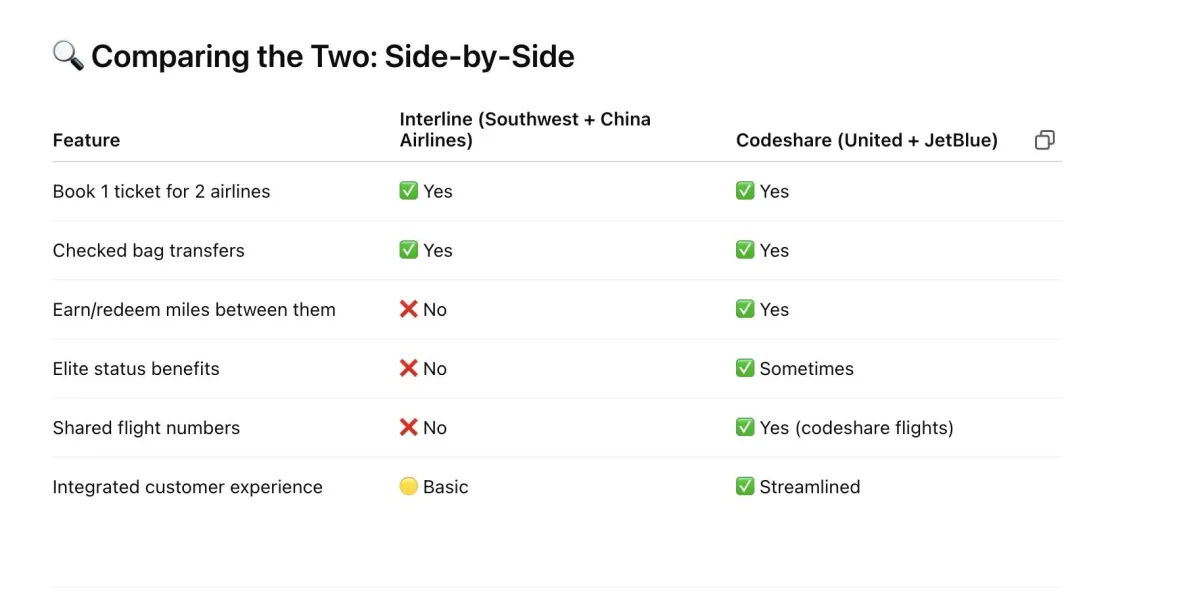
Interline vs. Codeshare: What’s the Difference and Why It Matters for Your Next Trip
As airline partnerships expand, travelers are starting to see new options pop up when booking flights — like Southwest offering flights to Asia or JetBlue teaming up with United. But not all partnerships are created equal.
Let’s break down two major types of airline partnerships: interline agreements (like Southwest + China Airlines) and codeshare agreements (like United + JetBlue). These terms get thrown around a lot — but if you’re not careful, they can lead to very different travel experiences.
✈️ What Is an Interline Agreement?
An interline agreement is the most basic type of airline partnership. It’s essentially a handshake deal between airlines that says:
“We’ll help passengers get from Point A to Point B together — but that’s where our partnership ends.”

✅ What You Can Do with an Interline:
Book one ticket that includes flights on both airlines (e.g., Southwest from LAX to LAX, then China Airlines to Taipei).
Have your checked bags transferred automatically between airlines.
Get some protection if your first flight is delayed and causes you to miss the second.
❌ What You Can’t Do:
You can’t earn or redeem frequent flyer miles across the airlines.
You won’t get elite perks like lounge access, priority boarding, or free upgrades — even if you have elite status with one of them.
Flights will still show under their original airline’s flight number, not a shared one.
🛑 Real Talk:
If you’re used to perks like upgrades or lounge access — don’t expect them here. This is strictly about convenience and bag transfers.
🛫 What Is a Codeshare Agreement?
A codeshare agreement is a deeper level of partnership. Airlines basically agree to behave like one brand when it benefits the traveler.
Take United and JetBlue as a current example. Under this kind of deal:
“We’ll sell each other’s flights, share flight numbers, and give our elite flyers some perks.”
✅ What You Can Do with a Codeshare:
Book a JetBlue flight through United.com (and vice versa).
See JetBlue flights with United flight numbers (and vice versa).
Earn and redeem miles between the two programs.
Get elite benefits like early boarding, preferred seating, and possibly even same-day standby across airlines.

🟡 But Remember:
Flights are still operated separately — different planes, policies, and flight crews.
Not all perks are guaranteed across all routes, especially internationally.
You’ll still need to pay attention to which airline is operating your flight.
🔍 Comparing the Two: Side-by-Side
🧠 Final Thoughts from Ben
If you’re flying Southwest and China Airlines on the same trip — it’s nice that your bags will transfer, but don’t expect much beyond that. It’s a basic travel convenience, not a luxury partnership.
On the flip side, United and JetBlue’s codeshare could actually improve your experience — especially if you hold elite status or care about earning every point possible.
Here’s the easy way to remember it:
💡 “An interline is like dating casually — you’re together for now. A codeshare is like moving in together — you’re sharing perks, space, and responsibilities.”
Want more breakdowns like this? Join my next Airline Points Academy class where we go even deeper into alliances, hidden tricks, and how to travel like a pro without paying like one.
P.S. If you're wondering which airlines or credit cards work best with your travel goals, come to one of my free live classes. You’ll learn how to turn your everyday spending into flights, upgrades, and five-star hotel stays.
